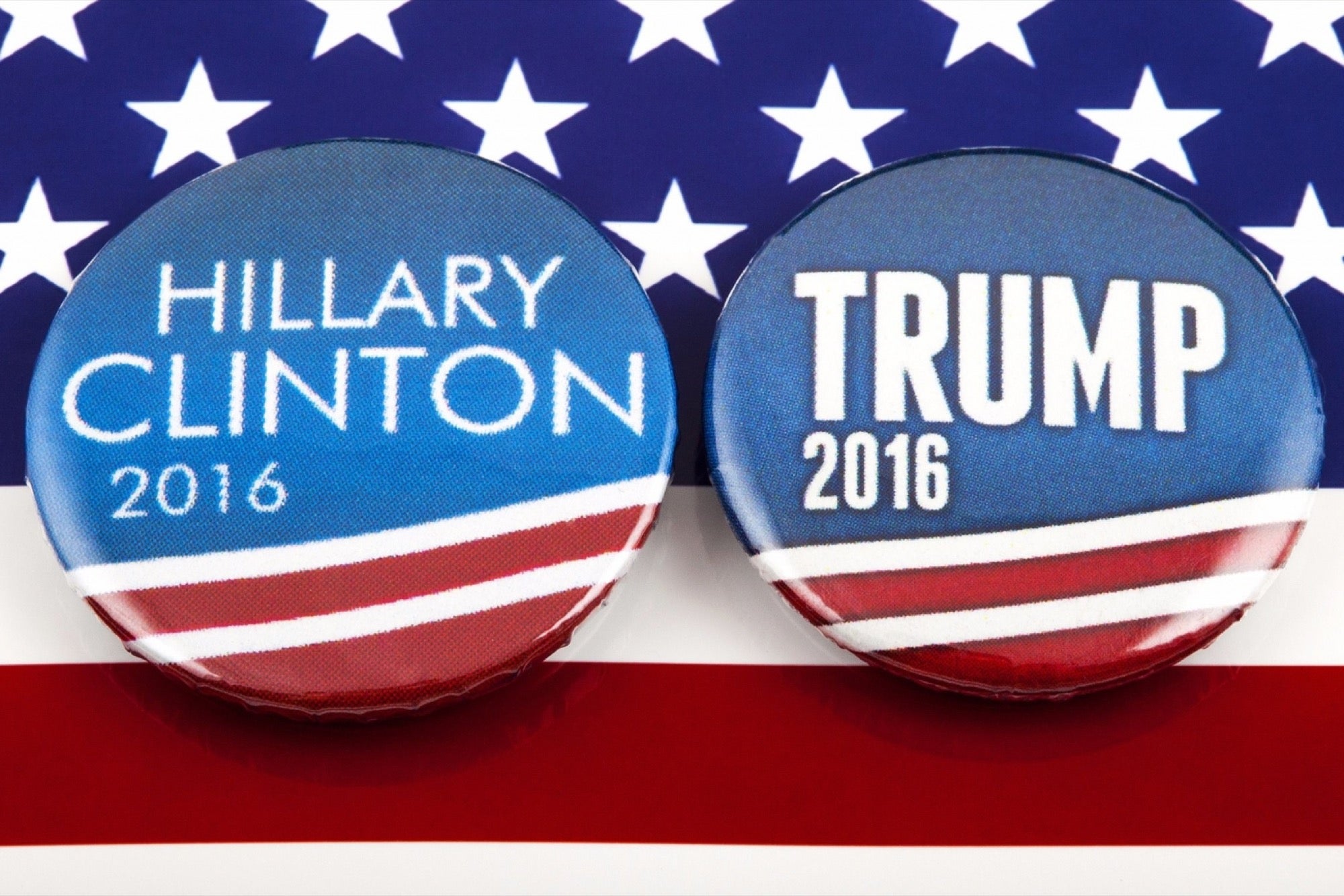Trump vs. Clinton -- Hot Topics That Will Affect The Average American Put aside the hot-button issues a moment and delve into the political differences that may impact your business.
By Sujan Patel Edited by Dan Bova
Opinions expressed by Entrepreneur contributors are their own.

For the average American, following the ideas and proposals of presidential candidates isn't always easy. The press likes to jump on the stories that garner the most attention, and focus laser-like on the hot-button issues. Think: Donald Trump's comments about banning Muslim immigrants, and the heat Hillary Clinton has taken for her use of a private email server for official communications.
Related: Donald Trump Has Mastered These 5 Psychological Tactics to Get Ahead
Meanwhile, the actual political positions of these candidates tend to go unnoticed by all except the most politically engaged citizens, who are meticulous in their research.
Certainly, you'll hear a lot about tax reform, trade agreements, small business, minimum wage and immigration -- the hot topics as the 2016 election gains momentum. But there's a lot more to the candidates' positions, and it directly impact the lives of Americans. With less than six months to go before the election, it's worth digging into all of the issues to see how Trump's or Clinton's policies might impact you and your family:
Trump vs. Clinton -- the economy
After two elections dominated by economic issues, this one in 2016 is shaping up to be no different, as voters consistently rank the economy their top concern. While the unemployment rate has fallen since President Obama took office in 2009, and there has been consistently strong job growth, not all Democrats are eager to embrace the economic legacy of President Barak Obama. Their presumptive nominee sometimes sounds like one of them: During one economic speech, Clinton stated that the economy "still isn't delivering."
Clinton is standing up for workers who want equal and better pay, as she supports an increase in minimum wage across the country. And, thankfully, both candidates propose policies on tax filing and tax reform that will ease the burden on businesses and individuals, by aiming to put more money back into the pockets of working families, and hopefully allow for more job creation.
The environment and science
After years of cutbacks, federal spending on science is at its lowest percentage since World War II. That's surprising, considering that climate change is one of the most partisan issues snaking its way through this presidential race.
Related: 2016 Election Causing Many Small-Business Owners to Feel Down
The Obama administration pledged to cut U.S. emissions by as much as 28 percent from 2005 levels, but the Republican Party is criticizing that move. The administration's pledges have also brought about lawsuits from industry groups, particularly those in coal-producing states.
Trump, meanwhile, says that climate change is a "hoax" created by special interest groups that negatively affect businesses.
Clinton, however, proposes a push toward clean energy to make the United States a "clean energy superpower of the 21st century." She supports the administration's pledge to lower greenhouse gas emissions.
Criminal justice
There hasn't been a lot of debate around criminal justice issues among Republicans and Democrats, but it's a growing issue for Americans with concerns about mass shootings, crime, police violence and prison sentencing.
Clinton is calling for "ending the era of mass incarceration" and praises the use of body cameras to record police interactions with civilians, in an effort to keep police officers accountable. Clinton also wants to expand background checks for guns and make it harder to purchase firearms online and at gun shows.
Trump firmly states that protecting Americans' Second Amendment rights will make America great again, and offers no new gun regulations. On his platform website, regarding gun control, Trump states, "The Second Amendment to our Constitution is clear. The right of the people to keep and bear arms shall not be infringed upon. Period."
When asked about the growing concern over police brutality, Trump has stated that more power should be given to the police.
"It's a massive crisis," Trump said on Meet the Press. "Some horrible mistakes are made. At the same time, we have to give power back to the police, because crime is rampant . . . we have to give power back to the police, because we have to have law and order."
Healthcare
The rising cost of healthcare, including the costs for pharmaceutical drugs, is a growing concern for Americans, and both candidates recognize that change is necessary.
Clinton supports the Affordable Care Act, also known as Obamacare, but she proposes changes that would make healthcare more affordable, including a move to put a $250 monthly cap on out-of-pocket drug spending and increased competition for specialty drugs.
Trump sees rising costs of pharmaceuticals as pure profiteering, and has called this phenomenon "disgusting." He aims to disassemble the Affordable Care Act and create a marketplace designed to create competition among health insurance providers. He believes this would bring down the cost of insurance. He rejects the idea of forcing Americans to buy health insurance.
Education
Education is also not being widely discussed by the candidates, or Americans in general. According to Gallup polling, only about 4 percent of Americans consider education to be the nation's most important problem. But it is a problem.
Clinton is proposing a plan to make community college free. Trump and the Republican Party want to encourage colleges and universities to find ways to reduce costs by accrediting nontraditional education and making schools responsible for student loan interest.
The Common Core State Standards Initiative that details what kids should know in English and math is a big topic that has divided parents and educators on its effectiveness. Clinton says she has always supported national education standards, and wants to see the same set of common standards for all public schools across the nation.
Related: Hillary Clinton's Top 10 Rules for Success
Trump strongly believes in limiting federal regulation and government overreach. He says that Common Core is "education through Washington, D.C. I don't want that."










